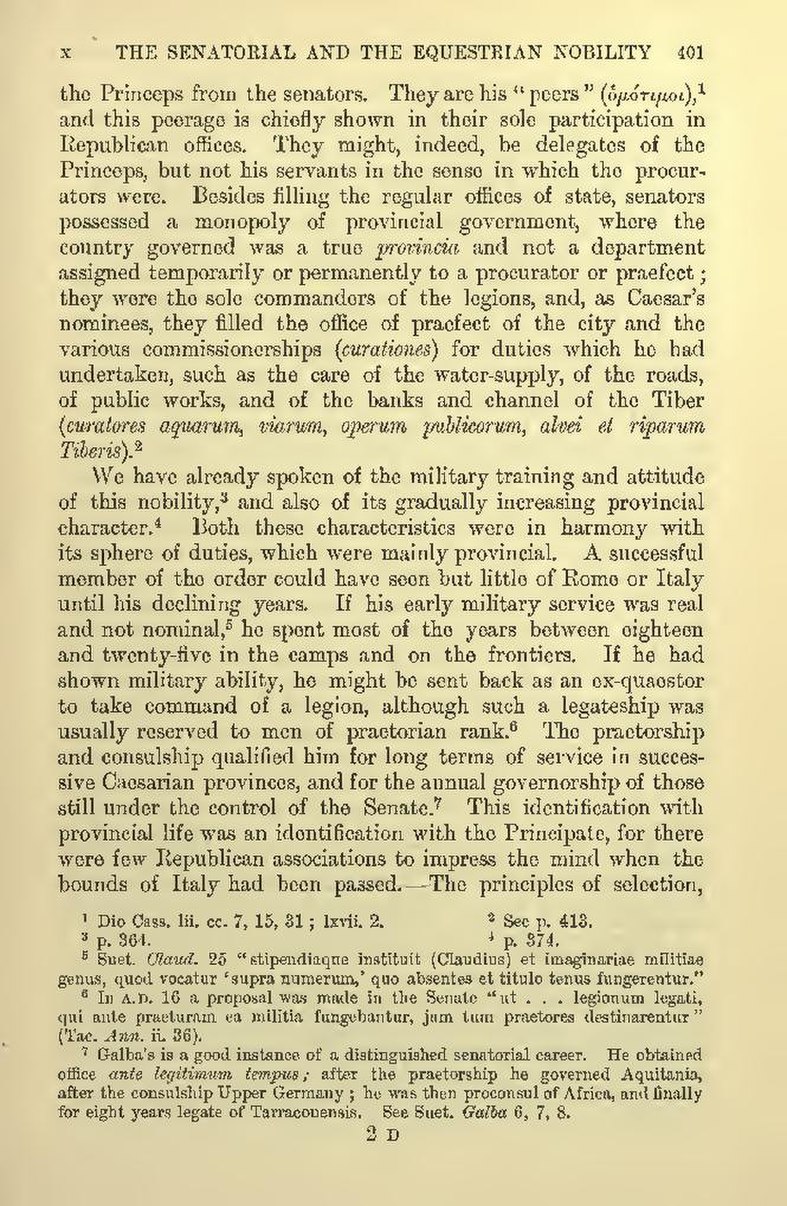the Princeps from the senators. They are his "peers" ([Greek: homotimoi]),[1] and this peerage is chiefly shown in their sole participation in Republican offices. They might, indeed, be delegates of the Princeps, but not his servants in the sense in which the procurators were. Besides filling the regular offices of state, senators possessed a monopoly of provincial government, where the country governed was a true provincia and not a department assigned temporarily or permanently to a procurator or praefect; they were the sole commanders of the legions, and, as Caesar's nominees, they filled the office of praefect of the city and the various commissionerships (curationes) for duties which he had undertaken, such as the care of the water-supply, of the roads, of public works, and of the banks and channel of the Tiber (curatores aquarum, viarum, operum publicorum, alvei et riparum Tiberis).[2]
We have already spoken of the military training and attitude of this nobility,[3] and also of its gradually increasing provincial character.[4] Both these characteristics were in harmony with its sphere of duties, which were mainly provincial. A successful member of the order could have seen but little of Rome or Italy until his declining years. If his early military service was real and not nominal,[5] he spent most of the years between eighteen and twenty-five in the camps and on the frontiers. If he had shown military ability, he might be sent back as an ex-quaestor to take command of a legion, although such a legateship was usually reserved to men of praetorian rank.[6] The praetorship and consulship qualified him for long terms of service in successive Caesarian provinces, and for the annual governorship of those still under the control of the Senate.[7] This identification with provincial life was an identification with the Principate, for there were few Republican associations to impress the mind when the bounds of Italy had been passed. The principles of selection,
- ↑ Dio Cass. lii. cc. 7, 15, 31; lxvii. 2.
- ↑ See p. 413.
- ↑ p. 364.
- ↑ p. 374.
- ↑ Suet. Claud. 25 "stipendiaque instituit (Claudius) et imaginariae militiae genus, quod vocatur 'supra numerum,' quo absentes et titulo tenus fungerentur."
- ↑ In A.D. 16 a proposal was made in the Senate "ut . . . legionum legati, qui ante praeturam ea militia fungebantur, jam tum praetores destinarentur" (Tac. Ann. ii. 36).
- ↑ Galba's is a good instance of a distinguished senatorial career. He obtained office ante legitimum tempus; after the praetorship he governed Aquitania, after the consulship Upper Germany; he was then proconsul of Africa, and finally for eight years legate of Tarraconensis. See Suet. Galba 6, 7, 8.
